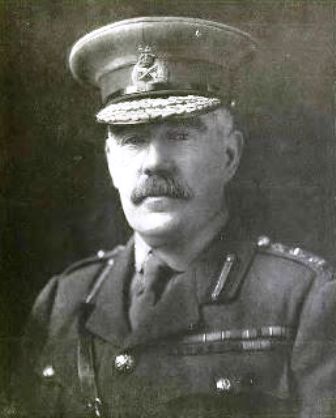23 December 1915
HELLES - The final decision to evacuate Helles was accelerated by the appointment of Lieutenant-General Sir William Robertson to the position of Chief of the Imperial General Staff on 23 December 1915. He was replacing General Sir Archibald Murray who had only held the post for three months, but was already generally regarded as indecisive and unable to exercise a meaningful influence on Kitchener; traits that Murray shared with his partial namesake and predecessor, Lieutenant-General Sir Wolfe-Murray. Robertson was a very different beast: a career soldier who had risen right through the ranks from private to general.
 Left: General Sir William Robertson, Imperial General Staff.
Left: General Sir William Robertson, Imperial General Staff.
His last posting had been as Chief of Staff to General Sir John French with the BEF Headquarters. Before taking up his new role as CIGS, Robertson had taken the precaution to closely define his relationship with the Kitchener in an effort to reduce the great man’s ability as Secretary of State for War to interfere directly in military operations. It was clear that this would be no mere post-holder: indeed Asquith was looking for an independent source of independent advice on the great strategic issues of the day. Robertson was an unbiddable, strong-minded individual was totally committed to the ‘Westerner’ camp intent on emphasising the primacy of the Western Front.
"It is one of the first principles of war that all available resources should be concentrated at the "decisive" point - that is, at the place where the main decision of the war is to be fought out. There may be a difference of opinion as to where that point should be, but there should never be more than one such point at a time, and once the selection is made, no departure from the principle just mentioned is admissible except (a) when it becomes necessary to detach troops for the protection of interests vital to oneself, for example the Suez Canal; or (b) when by detaching them the enemy will be compelled as a counter-measure to send a still larger detachment in order to protect interests which are vital to him. This principle, as old as the hills, had been inexcusably violated in 1914-15, and however much we might afterwards try to mitigate the evils resulting there from they could never be entirely removed."(General Sir William Robertson, General Staff)
Robertson’s appointment had followed the earlier appointment of General Sir Douglas Haig to command the BEF. Over the next three years the two men would attempt to graft an increasing professionalism onto the ramshackle nature of British strategic direction.
SOURCE:
W. Robertson, From Private to Field Marshal (London, Constable & Co., 1921), p.248.
